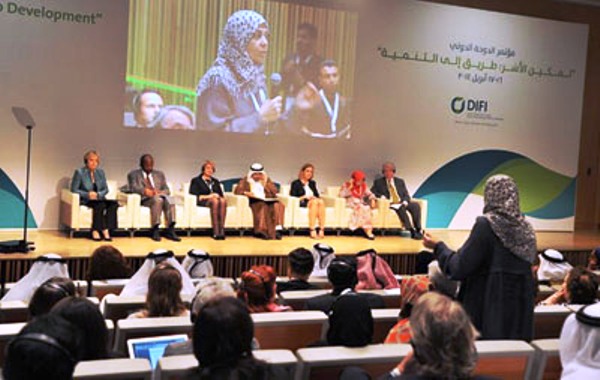![]()
The Words of the Walsh Family
|
|
The Words of the Walsh Family |

Doha, Qatar -- The Doha International Family Institute (DIFI) hosted an impressive mix of policy makers, researchers, academics, and UN and NGO representatives dealing with aspects of family policy and good practices from around the world during a conference April 16-17, 2014, in the beautiful Qatar National Convention Center. The theme was "Empowering Families: A Pathway to Development."
The goal for this high-level gathering was to "stress the need to strengthen and empower the family to cope with the challenges in this time of economic crisis and political turmoil and provide an opportunity to highlight the important role of the family as an active agent in overall development."
Rich discussion focused on why families matter in all levels of human, social and economic development followed by numerous presentations of concrete, effective practices and policies particularly in the areas of addressing family poverty and social exclusion, ensuring work-family balance and promoting intergenerational solidarity.
During a plenary panel on "The Family and the Post-2015 Development Agenda" Taj Hamad, representing WANGO and Universal Peace Federation, addressed the reasons why the family has been largely ignored in the goal setting and policies of the UN and stressed the need to strengthen the parents' role. Some of the topics covered in the panel sessions were the family and gender equality, men in families, and the family and civil society.
One highlight was the impassioned and articulate speech given by H.H. Sheikha Moza bint Nasser, Chairperson, Qatar Foundation, as she pointed to the impact of the entertainment media saying, "Cultural invasion has targeted the core identity of the Arab family, its culture, language and religion."
At the close of these intense two days, a "Call to Action" was formulated providing focal areas of action for all participants in their diverse areas of work. Besides the excellent exchange of information and insight and this final document, another important accomplishment of this conference was the building of networks and future collaborations as new relationships were formed among participants from around the world.
As this conference provided substantial evidence for the need for family empowerment and concrete methods to move forward, it also empowered and encouraged everyone present with new energy, resources, and knowledge. From many of comments heard, participants have a greater conviction that, with our efforts, the world will become a better place as the family is strengthened and regains its central role in solving and preventing much of the world's dilemmas and creating a vibrant world, family by family.
We, the representatives of civil society, academia, policy makers and individuals participating in the International Conference organized in Doha, Qatar on the 16-17 of April, 2014 by the Doha International Family Institute (DIFI), member of Qatar Foundation for Education, Science and Community Development, to commemorate the twentieth anniversary of the International Year of the Family;
Having considered the conference theme "Empowering Families: A Pathway to Development,"
Reaffirming that the family is not only the fundamental group unit of society but is also the fundamental agent for sustainable, social, economic and cultural development,
Stressing the importance of designing, implementing and monitoring family-oriented policies, especially in the areas of poverty eradication, full employment and decent work, work family balance and social integration and intergenerational solidarity,
Emphasizing that the achievement of development goals especially those relating to the eradication of poverty, education of children, especially girls and reduction in maternal mortality depends, to a significant extent, on how families are empowered to fulfill their numerous functions,
Emphasizing further that strategic focus on families offers a comprehensive approach to solving some of the persistent development challenges such as inequality and social exclusion,
Call on governments to empower and enable families to contribute to development by taking the following actions:
1. Develop comprehensive and coherent policies, integrate cross-sectorial approaches to support family stability and establish/strengthen a national mechanism to develop family-oriented policies and programs and allocate adequate human and financial resources to implement, monitor and evaluate them.
2. Promote gender equality and the empowerment of women, reform discriminatory laws and policies, particularly family laws, and enact legislation to end child marriage and violence against women.
3. Recognize the contribution and responsibility of men to families, develop policies to address the impact of the absence of males/fathers on family well being and promote active fatherhood.
4. Focus poverty alleviation strategies on the family as a unit and acknowledge that family breakdown can be both a root cause and an effect of poverty and its prevention is a priority.
5. Adopt policies to ensure work-family balance, so that the responsibilities of parenting and maintaining families do not fall primarily on women and collaborate with the private sector to protect and support workers with family responsibilities.
6. Value important contributions of all generations within the family, design and implement policies to strengthen intergenerational solidarity and partnerships and promote healthy intra-familial relations.
7. Ensure the systematic collection of data and statistics on family well being and collaborate on good practice exchange at national, regional and international levels.
8. Develop and implement family focused policies and interventions to strengthen and support families in vulnerable situations (such as conflict, natural disasters and health epidemics including HIV/AIDS and malaria).
9. Create an enabling environment for a meaningful contribution of civil society organizations in the design, implementation and monitoring of family policies and programs and remove barriers to the establishment, work and funding of non-governmental organizations.
10. Acknowledge that families are at the center of sustainable development and ensure that families are an integral part of the post 2015 development agenda.